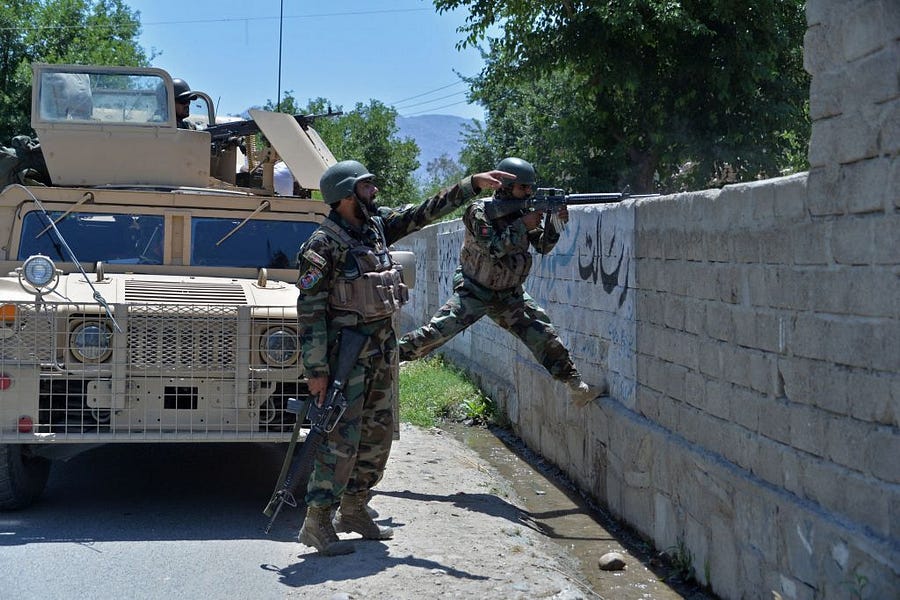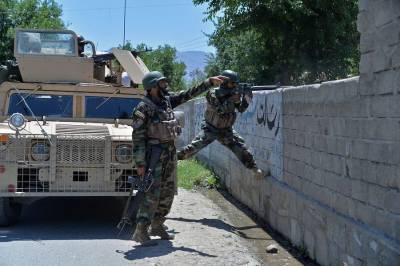Good morning. The joint Senate Rules and Homeland Security report on the January 6 Capitol attack is out. It details the U.S. Capitol Police leadership’s failure to prepare for the possibility of broad violence and the bureaucratic delays that hampered the response. You can read the whole report here.
Lawmakers Urge Evacuation of Afghan Allies
Members of Congress are increasingly calling for the Biden administration to evacuate thousands of Afghan allies who helped the United States and coalition forces during the war in Afghanistan, as well as their family members.
A bipartisan group of 21 lawmakers warned in a letter on Friday that the current process for approving special visas for Afghan allies is too slow—and the U.S. government will not be able to guarantee the safety of those who helped the war effort once American troops have fully withdrawn from the country.
“Our Afghan friends and allies are at greater risk than ever before,” the members of Congress wrote.
“We appreciate the complexity of ending the war in Afghanistan, but we are increasingly concerned that you have not yet directed the Department of Defense be mobilized as part of a concrete and workable whole of government plan to protect our Afghan partners,” they added.
The lawmakers pointed to previous instances in which the United States has carried out mass evacuations, including thousands of Kurds from Iraq in 1996 and more than 100,000 Vietnamese refugees after the fall of Saigon in 1975. Both groups were brought to Guam, a U.S. island in the western Pacific, for processing before entering the continental United States. The lawmakers said a similar plan could work with Afghan allies, temporarily holding them either in Guam or another location. They called on President Joe Biden to establish an interagency task force to handle the evacuation and visa management.
In the letter, they said they had spoken with the non-voting U.S. House delegate from Guam, Del. Michael San Nicolas, about the possibility, and noted that the island would need robust vaccination resources and a housing plan to prevent coronavirus spread among the refugees and in the broader local area.
“If we fail to protect our allies in Afghanistan, it will have a lasting impact on our future partnerships and global reputation, which will then be a great detriment to our troops and the future of our national security,” they wrote.
Members of Congress from both parties have prioritized assisting Afghan allies since Biden announced his plans in April to withdraw American forces from the country by September 11.
Democratic Rep. Jason Crow, one of the lead members of the letter on Friday, introduced legislation earlier this year to expedite the approval process for the more than 18,000 waiting Afghan applicants to the Special Immigrant Program. That number doesn’t include the tens of thousands of family members of the principal applicants who are waiting for approval as well. The program has allowed thousands of Afghans into the United States as lawful permanent citizens since it was established, but the wait can be long, and those seeking admission face hurdles that lawmakers fear will not be surmountable after the military withdrawal is complete.
Crow’s bill would slash some of the red tape by waiving a medical examination requirement for refugees prior to being accepted. Crow said when he introduced the measure that Afghan applicants have struggled with the cost of getting the exam, and the process is slow because there is only one facility in Kabul that conducts immigrant visa examinations for the entire country. Travel to and from the site can be dangerous, he said.
His bill would lift that prerequisite, while still ensuring any Afhgan admitted to the United States who hasn’t had a medical examination beforehand would receive one within 90 days of entering the country.
But lawmakers say efficiency boosts like this will still not meet the urgent need to get people to safety in time. Interpreters and other Afghans who worked for the U.S. government and coalition forces face reprisals from the Taliban. According to the nonprofit No One Left Behind, which helps those applying for special immigrant visas, at least 300 interpreters or their family members have been killed by insurgents or terror groups since 2014.
American officials have acknowledged it’s not certain whether the Afghan government will be able to withstand the Taliban’s onslaught without the American military’s help. There was a wave of Afghan surrenders to the Taliban in the month of May, as American and coalition troops began to leave. Afghan troops are also experiencing high casualties amid a surge in militant attacks—more than 150 were killed or injured in the last 24 hours, Reuters reported yesterday.
And the Afghan forces’ most important advantage over the Taliban, air power, could be crippled when American contractors depart.
From NBC over the weekend:
The Afghan security forces rely heavily on U.S.-funded contractors to repair and maintain their fleet of aircraft and armored vehicles, and a whole array of other equipment. But the roughly 18,000 contractors are due to depart within weeks, along with most of the U.S. military contingent, as part of Washington's agreement with the Taliban to withdraw all "foreign" troops.
Without the contractors' help, Afghan forces will no longer be able to keep dozens of fighter planes, cargo aircraft, U.S.-made helicopters and drones flying for more than a few more months, according to military experts and a recent Defense Department inspector general's report.
Defense Secretary Lloyd Austin has tasked officials with developing options to protect Afghans who helped U.S. forces, including potentially evacuating them, Pentagon press secretary John Kirby told Defense One recently. Still, Kirby said, “We aren’t at a stage right now where evacuation is being actively pursued.”
State Department spokesman Ned Price told reporters last week that the department has increased its staffing in D.C. to approve special immigrant applications more quickly.
“We understand and we recognize that we have a special commitment and a special responsibility to the many Afghans who, over the years, have at great risk to themselves and even to their families, have assisted the United States in our efforts in Afghanistan,” Price said.
Lawmakers pressed Secretary of State Antony Blinken on the issue during a House Foreign Affairs Committee hearing Monday morning.
Blinken said the State Department is “looking very actively at every possible contingency to make sure that we can accommodate and care for those who’ve helped us and are seeking to leave.”
Of the 18,000 principal applicants, Blinken said, about half are at the very early stage, in which they have expressed interest but have not submitted required forms. The other 9,000 are further along, he said, with about 30 percent of those waiting for approval from the chief of mission determining that they are eligible. The remaining 20 percent have made it past that point and are in the immigration process, which has been beset with backlogs amid the coronavirus pandemic.
He said he expects the backlog to be addressed in the coming months. He also called for Congress to raise the cap for admissions under the program to ensure all of the eligible applicants can be approved. Texas Rep. Michael McCaul, the top Republican on the Foreign Affairs committee, said he’s confident Congress will increase that cap as part of the annual defense authorization bill this year.
Asked about evacuation, Blinken reiterated it is a possibility, but pushed back on the idea that it will be impossible to continue the special visa process once American troops have fully withdrawn from the country.
“Whatever happens in Afghanistan, if there is a significant deterioration in security—that could well happen, we’ve discussed this before—I don’t think it’s going to be something that happens from a Friday to a Monday,” he argued. “So I wouldn’t necessarily equate the departure of our forces in July, August, or by early September, with some kind of immediate deterioration in the situation.”
Lawmakers feel a sense of urgency, though.
“The clock is ticking and the Taliban are on the march,” McCaul said in his opening statement. He threw his support behind evacuating those who have reached a significant stage in the vetting process to a third country.
“The time for platitudes and vague promises is over,” McCaul said. “We need action, and we need it yesterday.”
On the Floor
The House is out this week. The Senate is in and is expected to vote on final passage of the sweeping Innovation and Competition Act later today. Senators are also scheduled to consider a slate of judicial nominees this week, and the chamber may take up a House-passed equal pay bill, which isn’t expected to advance.
Key Hearings
Secretary of State Antony Blinken will testify at a Senate Foreign Relations Committee hearing this afternoon about President Biden’s fiscal year 2022 budget request for the State Department. Information and livestream here.
Joseph Blount, the CEO of Colonial Pipeline, will appear before the Senate Homeland Security and Governmental Affairs Committee on Tuesday morning for a hearing about the recent ransomware attack. Information and livestream here. Blount is also slated to join the House Homeland Security Committee on Wednesday at noon for a hearing on the same topic. Information and livestream here.
Shalanda Young, acting director of the Office of Management and Budget, will testify about President Joe Biden’s fiscal year 2022 budget request before the Senate Budget Committee this morning. Information and livestream here. Young will also appear before the House Budget Committee tomorrow morning. Information and livestream here.
FBI Director Christopher Wray is scheduled to testify before the House Judiciary Committee for an oversight hearing Thursday morning. Information and livestream here.
Several government officials will testify about the federal response to the surge in unaccompanied children at the southern border on Thursday at 2 p.m. before a House Homeland Security subcommittee. Information and livestream here.
The House Administration Committee will hold a hearing on voting access in America on Friday morning. Information and livestream here.
Defense Intelligence Agency Director Scott Berrier and NSA Director Paul Nakasone will testify at a House Armed Services subcommittee hearing Friday morning on the Defense Department’s intelligence strategies. Ronald Moultrie, under secretary of defense for intelligence and security, will also appear. Information and livestream here.






Please note that we at The Dispatch hold ourselves, our work, and our commenters to a higher standard than other places on the internet. We welcome comments that foster genuine debate or discussion—including comments critical of us or our work—but responses that include ad hominem attacks on fellow Dispatch members or are intended to stoke fear and anger may be moderated.
With your membership, you only have the ability to comment on The Morning Dispatch articles. Consider upgrading to join the conversation everywhere.